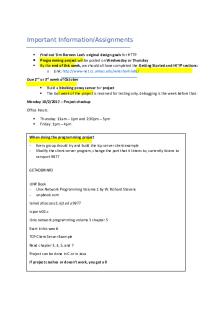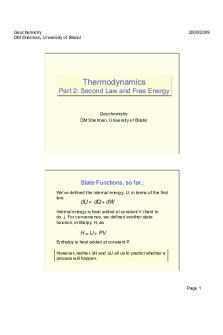Cases - Lecture notes 2 PDF

| Title | Cases - Lecture notes 2 |
|---|---|
| Course | Introduction to Obligations |
| Institution | University of Kent |
| Pages | 4 |
| File Size | 112.8 KB |
| File Type | |
| Total Downloads | 111 |
| Total Views | 158 |
Summary
Lecture Notes...
Description
Cases
The law on ICLR There are two presumptions regarding the existence of ICLR: In commercial contracts, an ICLR is regarded as present, unless the parties expressly negative it In domestic and social agreement the presumption is the other way... But it is easier to rebut, and does not always need express words: can be inferred from the context Balfour v Balfour Wife stayed in UK and husband went back to Ceylon (Sri Lanka) H said he would pay her £30 per month in return for her not claiming any other maintenance [2019: £1389] H refused to pay
Atkin LJ All I can say is that the small Courts of this country would have to be multiplied one hundredfold if these arrangements were held to result in legal obligations. They are not sued upon, not because the parties are reluctant to enforce their legal rights when the agreement is broken, but because the parties, in the inception of the arrangement, never intended that they should be sued upon. Agreements such as these are outside the realm of contracts altogether. The common law does not regulate the form of agreements between spouses. Their promises are not sealed with seals and sealing wax. The consideration that really obtains for them is that natural love and affection which counts for so little in these cold Courts. The terms may be repudiated, varied or renewed as performance proceeds or as disagreements develop, and the principles of the common law as to exoneration and discharge and accord and satisfaction are such as find no place in the domestic code. The parties themselves are advocates, judges, Courts, sheriff's officer and reporter. In respect of these promises each house is a domain into which the King's writ does not seek to run, and to which his officers do not seek to be admitted.
Trial Determination of facts where they are in dispute (witnesses and other evidence) Decision on law to be applied Effect of applying law Order of court (remedy) which in some way changes the status quo Single judge acts alone in nearly all first instance civil claims (not tribunals) Court of Appeal Consider whether findings of fact at trial are safe; if not, normally new trial. Consider whether law correctly stated Consider whether law correctly applied Outcome may be: appeal dismissed (no change in order at trial); appeal allowed, and outcome changed; new trial
Judgment may be given at end of counsel’s argument, or reserved ie given after consideration (old term – “cur ad vult”) Court of Appeal does not conduct a new trial –remitted to court of first instance The cases Simpkins v Pays[1955] 1 WLR 975: first instance (Chester Assizes); Claimant succeeded Tanner v Tanner [1975] 1 WLR 1346 : on appeal, County Court decision reversed and claimant succeed Wilson v Burnett [2007] EWCA Civ 1170: on appeal, County Court decision upheld, claimant did not succeed. Simpkins v Pays Facts: Mrs Simpkins (claimant) moved in as lodger with Mrs Pays (Defendant) and the latter’s granddaughter, Esme. Both S and P competed in a weekly competition run by the News of the World. S also regularly took part in a competition run by the Sunday Empire News on her own. Some time later, S, P, and E joined forces to compete together in the Sunday Empire News competition. Simpkins v Pays The competition required them to send in a coupon setting out three forecasts relating to items of fashion, which had to be ranked in order of merit. Each of the three would provide one forecast, which would then be sent in to the SEN in P’s name. Stamps were paid for more or less alternately (thought it seems S paid for this particular submission). Simpkins v Pays E’s forecast was successful, resulting in winnings of £750 [2019: £19,820] P and E sought to exclude S from the winnings. S insisted on ‘going shares’ and being paid a third (£250). P argued before the court that the arrangement was that if any forecast won, then the winnings were to go to her alone. Simpkins v Pays Conflicting oral evidence Two issues: Was there an agreement to share? Was it intended to have legal consequences? (ie was there an intention to create relations?)
Simpkins v Pays Sellers J held: That it was ‘most improbable’ that S, ‘with all her propensity for having a gamble… suddenly abandoned her interest in the competition in the Empire News’ once she joined forces with P.
While in family circles/close friendships, it was conceivable that someone might help someone else fill in a coupon purely for the latter’s sake, so that they alone would receiving any winnings, the facts and probabilities did not support this position here. ‘…there was here a mutuality in the arrangement between the parties. It was not very formal, but certainly in effect it was agreed that every week the forecast should go in the name of the defendant, and that if there was success, no matter who won, all should share equally’ (979). Sellers J was prepared to infer an intention to be legally bound- why?
Facts: Claimant was Eric Tanner : a “milkman during the day and a croupier at night” (Lord Denning); already married with children ET had affair with Josephine Macdermott. She gave birth to twin girls, and ET paid her £5/week maintenance [2019:£71]; she became known as Mrs Tanner The two decided that JT should move out of her flat and that she and the girls should be housed in North Finchley. ET bought house with mortgage, and JT and twins girls moved into the ground floor of the house. They let the first floor, with JT managing the lettings and collecting the rent. ET ceased paying her maintenance. ET began seeing someone else… ET said he wanted her out of the house and offered her £4,000 to go [2019:£57k] JT refused, claiming he had agreed that the house was to be ‘ours’ until the children left school. ET brought proceedings to evict JT JT argued that she was in the house under licence which ET could not revoke while the girls were of school age. The county court judge rejected the argument, saying that ET never intended to marry JT and that she knew this, and that she moved to the house because she thought it best for herself and the girls, not on the basis of future security. An order for possession within six weeks was made. Lord Denning MR held: JT had given up Rent-Act-protected accommodation to move into the house and look after the children at ET’s insistence. The house had been acquired ‘in the contemplation and expectation that it would provide a home for the defendant and the twin daughters.’ This gave rise to a licence which ET could not revoke whenever he felt like it, as recognized by the £4,000-offer. JT held a contractual licence to occupy the house to use with her children so long as they were of school age and the house was reasonably required for her and the children (1350). The possession order ought not to have been made. JT should be awarded £2,000 for loss of the licence.
Had there been no consideration, then the licence could have been terminated at short notice. Consideration was present: the terms were that JT should give up her flat and look after the twins in the house. No express consideration of whether there was an intention to create legal relations... Focus is on whether the licence was revocable What do you think was the most important factor in persuading the court that this was a binding arrangement? Wilson v Burnett Facts: Tania Burnett (defendant), Stacy Wilson, and Abigail Stacey (claimants) worked together; they arranged to go out to play bingo. TB won a local prize of £153 and a national prize of £101,211. o AS and SW claimed there was a prior agreement to share winnings between the three of them TB: there had been a discussion about sharing winnings (SW saying she always shared and TB saying she never did), but no agreement. Wilson v Burnett At trial o Various other inconsistencies in their evidence.... o But accepted by claimants that, after local win , they kept saying to TB, ‘Are we going to share?’ while waiting for the national result o The judge found for TB, and SW and AS appealed on the grounds that the judge’s reasons and reasoning were insufficient; in particular, that the judge preferred TB’s evidence without clearly indicating why.
Wilson v Burnett May LJ held: It was not clear whether the judge had held for TB because he preferred her evidence and rejected that of the others, or because he found that what agreement there might have been did not entail intent to create legal relations, or because of a combination of the two. The evidence of what happened at the bingo hall did not support what had been allegedly agreed on the earlier occasion. Some of the judge’s reasoning was open to critical analysis. “The reality, I think, is that the claimants’ bare bones account of what they say was agreed at their place of work, taken alone, scarcely stands as an agreement binding and enforceable in law.” May LJ This case is not in any series of reports, and the judgment is only available as a transcript (eg via Westlaw or BAILII): it does not turn on issue of law An illustration of how law applied to contested facts How was this case different from Simpkins v Pays- why was it easier to establish a binding agreement there despite there also being conflicting evidence?...
Similar Free PDFs

Cases - Lecture notes 2
- 4 Pages

Cases - Lecture notes 1-12
- 3 Pages

Business Law 2 Notes Cases
- 26 Pages

Week 4 Cases - Lecture notes 4
- 3 Pages

Lecture notes, lecture 2
- 3 Pages

2 - Lecture notes 2
- 5 Pages

Partnerships cases - notes
- 4 Pages

Summarising-cases - Notes
- 2 Pages

Lecture notes, lecture Chapter 2
- 11 Pages
Popular Institutions
- Tinajero National High School - Annex
- Politeknik Caltex Riau
- Yokohama City University
- SGT University
- University of Al-Qadisiyah
- Divine Word College of Vigan
- Techniek College Rotterdam
- Universidade de Santiago
- Universiti Teknologi MARA Cawangan Johor Kampus Pasir Gudang
- Poltekkes Kemenkes Yogyakarta
- Baguio City National High School
- Colegio san marcos
- preparatoria uno
- Centro de Bachillerato Tecnológico Industrial y de Servicios No. 107
- Dalian Maritime University
- Quang Trung Secondary School
- Colegio Tecnológico en Informática
- Corporación Regional de Educación Superior
- Grupo CEDVA
- Dar Al Uloom University
- Centro de Estudios Preuniversitarios de la Universidad Nacional de Ingeniería
- 上智大学
- Aakash International School, Nuna Majara
- San Felipe Neri Catholic School
- Kang Chiao International School - New Taipei City
- Misamis Occidental National High School
- Institución Educativa Escuela Normal Juan Ladrilleros
- Kolehiyo ng Pantukan
- Batanes State College
- Instituto Continental
- Sekolah Menengah Kejuruan Kesehatan Kaltara (Tarakan)
- Colegio de La Inmaculada Concepcion - Cebu






